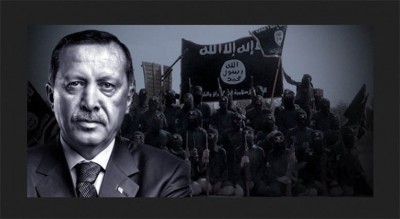Syria – Turkey Violates Astana Agreement – Renews Alliance with Al-Qaeda

Yesterday Turkish army forces entered the Syrian Idleb governate from the west. The move is officially part of a de-escalation supervision process agreed upon between Syria, Turkey, Russia and Iran. One point of the agreement is to continue the fight against al-Qaeda in Syria, currently operating under the name Hayat Tahrir al-Sham (HTS). HTS controls large parts of Idleb governate.
This is confirmed in the official Turkish Idleb Operation Explanation. “To purge terrorist organisations, especially DAESH, PKK/PYD-YPG and HTS from the region,” is described as one aim of its de-escalation force.
But the Turkish forces have made a deal with HTS. When their reconnaissance teams entered Idleb yesterday they were escorted by heavily armed HTS forces (video). According to their agreement with the terrorists the Turkish forces will only take up three positions. All of these will be bordering the Kurdish enclave Efrin (Afrin).

An (anti-Syrian government) journalist reports:
Hassan Hassan – Verified account @hxhassan – 5:22 PM – 8 Oct 20171. Turkey established three checkpoints in Darat Izzat, west of Aleppo, in coordination with HTS.
A senior HTS official tells @MousaAlomar Turkish forces won’t be present anywhere other than those checkpoints “for now.”2. Mousa asks a series of questions to the HTS official:
Q. Will the Turkish army enter [rebel-held] areas?
A. Yes (but not beyond the three areas agreed with HTS)
Q. Any imminent battle in Idlib?
A. No. So far things are good, unless Turkey changes its position
My own sources confirm that an effort to keep things peaceful between Turkey and HTS is so far successful.
The purpose of this Turkish incursion is obviously not to counter al-Qaeda/HTS but only to surround the Kurdish held enclave around Efrin.
An aggressive Turkish move could now try to cut of the Kurdish Efrin area (yellow) from the Syrian government held areas (red) by connecting the Turkish controlled rebel area in the north (blue) with the al-Qaeda controlled Idleb governate (green). Such a move would encounter fierce resistance not only from Kurdish elements and the Syrian government but also from Iran. Auxiliary Iranian troops hold the government corridor between Aleppo and Efrin to protect some important Shia villages in the area.
On one side one can understand the Turkish abrogation of its duties under the Astana agreement. Erdogan is afraid of the domestic backlash a real fight against HTS would likely cause. But it was Turkey that created the mess by supplying al-Qaeda in Syria with men and goods for nearly six years. It is its duty to kill the monster it created. It also has to uphold its diplomatic agreements.
Turkey has proven again that it is not trustworthy. Erdogan may hope to get NATO cover should he incur new Russian wrath about his breach of trust and his abrogation of the de-escalation agreement. But the expanding spat between the State Department and the Turkish government, as well as low Turkish standing within NATO populations, do not bode well for any bet on that alliance.

